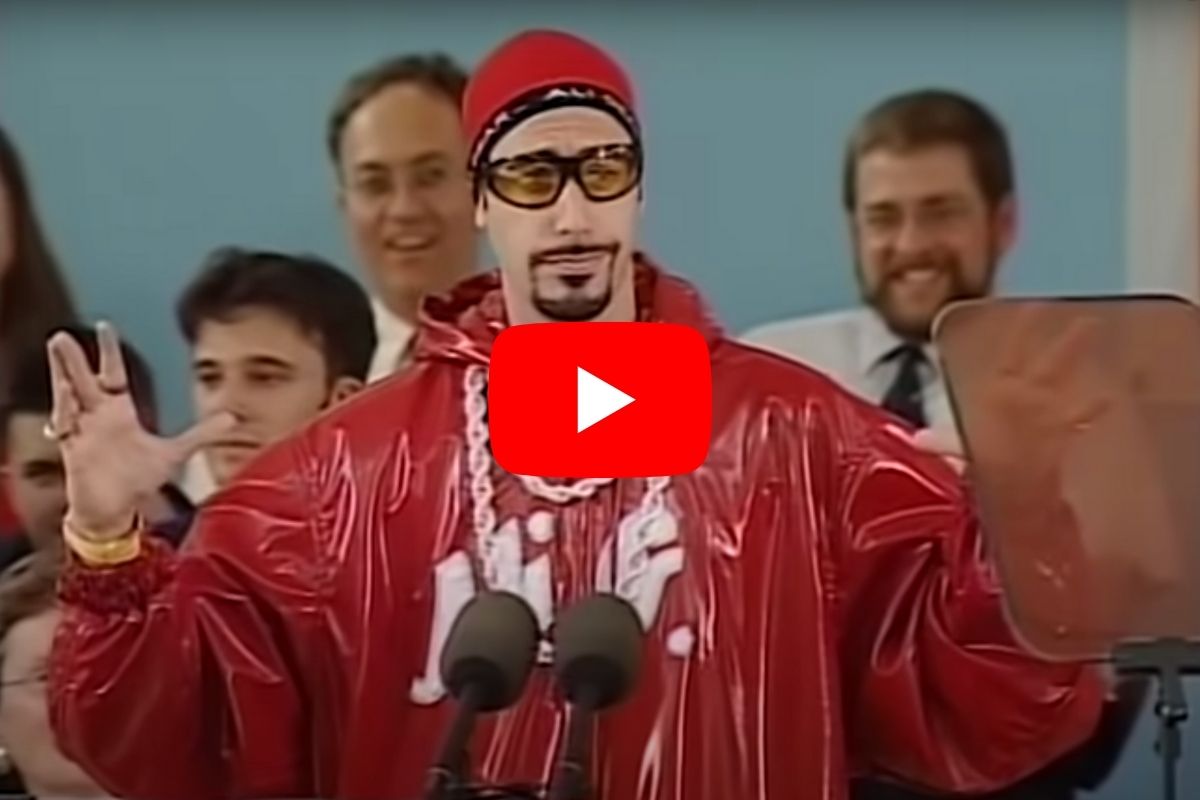Last night the sequel to Borat: Cultural Learnings of America For Make Benefit Glorious Nation of Kazakhstan, a.k.a. Borat Subsequent Moviefilm, earned Sacha Baron Cohen a Golden Globe. The second Borat film was released directly to Amazon Prime in October. Due to the Coronavirus pandemic, this unexpected sequel forewent a traditional theatrical run but that didn’t stop it from making headlines. Rudy Giuliani became the latest public figure duped by Sacha Baron Cohen’s disguised antics. Though, in 2020, excitedly tugging his pants off on camera was just a peripheral gaffe for the now full-on social pariah. Cohen, hilariously, used his acceptance speech to further lambast the lawyer as “a comedy genius… I mean who could get more laughs out of one unzipping? Incredible.”
Videos by Rare
And while the new Borat was entertaining, in an era fueled by the messy crossover between politics and reality TV, it lacked the bite of Cohen’s earlier work. Namely, HBO’s innovative early-aughts program, Da Ali G Show. The enduring genius of Sacha Baron Cohen’s OG character first occurred to me last May, when I turned my attention to an old YouTube video: Ali G’s 2004 commencement address at Harvard University. The forgotten clip by Cohen’s discarded persona is, increasingly, his most relevant bit
Remembering ‘Da Ali G Show’
Sacha Baron Cohen’s original character, the rapper Ali G, became popular for tricking the famously intellectual: people who should have “known better.” Taking on the persona of a ridiculous news correspondent, Cohen fully embodied exaggerated “hip hop” tropes (so popular in the year 2000) that made high-profile guests both confused and deeply uncomfortable. Ali G interviewed a number of relevant thinkers during the show’s three-year run, including Noam Chomsky, and political figures who mainly skewed conservative: Newt Gingrich and Pat Buchanan to name a few. Some were seduced into some very bad optics, like Republican U.S. congressional candidate James Broadwater who stated, point-blank, that Jews all go to Hell. Or Paula Abdul, who was cajoled by Cohen’s edgy Austrian character Bruno to use a Hispanic gardener like a footstool. None of it has aged well.
Da Ali G Show fascinated viewers who could not believe that celebrities, when prompted, would really say and do such things on camera. Being in elementary school at the time, I grew up sneakily watching these controversial clips online. Although most of the social references probably went over my head, I still remember cackling with delight whenever I saw those yellow, bug-eyed sunglasses wrapped around Sacha Baron Cohen’s expressive face. Every time the comedian snapped his fingers and yelled “Westside! Booyakasha!” my ten-year-old brain nearly exploded.
‘Who is America?’
Naturally, I remained a Sacha Baron Cohen fan. When Cohen’s latest show, Who is America? premiered in 2018, I couldn’t be more excited. The pilot had generated buzz before its release; Cohen, disguised as an “anti-terrorism expert,” convinced several Republican congressmen to go on record with a PSA advocating for kindergarteners’ gun rights. But the schtick in Who is America? — Cohen portrays a variety of eccentric characters bamboozling a new crop of big names — turned out to be predictable. What was meant to highlight the hypocrisy of our socio-political state only succeeded in lampooning forces that we, as viewers, are now too well aware of. It’s no longer so funny to laugh at former senate majority leader when he recommends arming “good guys, whether they be teachers… or highly trained preschoolers.”
Watch: Ali G Talks to Donald Trump
In Da Ali G Show, the emphasis was on trolling rather than tricking; Sacha Baron Cohen was not necessarily circling any dark fundamental truth. It was enough just to watch him waste everyone’s time. Now trolling is passé. For four years, Donald Trump held press conferences where every reporter was treated like Ali G: an imbecile, an imposter in the White House briefing room. As the role of president has shifted into the surreal, journalists were left scrambling in their own parallel parody. The man behind the podium might as well have been wearing yellow sunglasses, cheesy chains. Last spring, this evolving brand of the televised theater was deeply on my mind.
As a member of the Class of 2020, I graduated mid-pandemic. Despite a valiant effort, the online ceremony was depressing. While I was relieved to graduate, celebrating alone and many hundreds of miles from my classmates — and my school — felt futile. Unmoved by the speeches and inspirational messages which peppered our graduation video montage, I sought out additional commencement addresses on YouTube. I did want to feel like a graduating senior. But I also wanted to watch something which acknowledged how deeply distressing it was to begin adult life at this unsure moment. Surprisingly, it was a speech from 2004 that finally spoke to me: Ali G’s speech at Harvard University’s esteemed Class Day ceremonies.
Ali G’s Speaks at Harvard’s Commencement Address
Entirely in character, Sacha Baron Cohen showed up at Harvard University on June 9, 2004, and delivered an address that was uncomfortable and unforgettable. I settled into the twenty-minute video, expecting both nostalgia and the grave sense of melancholy that had become so habitual over the past six months. But my first feeling was of jealousy: it was hard to watch a real video full of bright-eyed 22 year-olds sitting so closely together. But as soon as Ali G bounds onto the stage of the Tercentenary Theatre in a glistening red vinyl tracksuit, it’s as if the clouds suddenly lift. Showtime. “Booyakasha!”
The performer begins with the typical rounds of off-color jokes: pay-per-view porn on the hotel TV, Moroccan chronic, learning the alphabet A-X, and calling the feminists as “lezzes.” Hilariously, the video cuts to many unamused faces spread across the diverse audience. It’s about halfway through the speech that things get interesting. “It costs 38,000 dollars a year to go to Harvard,” Sacha Baron Cohen announces clearly, his earnestness peeking through. Today, in 2021, that price more closely reflects a single semester; one total year of tuition and extra fees at private college now reaches up to $70,000 without aid. “And most of you,” he continues, “has got dat cash from ya parents. All you fathers out there, you has made some choices. With dat money you coulda bought a top-of-the-range Lexus, but instead you chose to invest in your kid’s future. Iz you mental?!” Everyone laughs. “So students give it up for your parents! Respeck them!”
There’s a round of applause as Ali G pauses to make his next point: like any graduating class, the students before him are likely worried about employment. “Unfortunately,” he predicts, “most of you will get jobs.” Ha. Inarguably, the Harvard grads are “the elite.” Ali G guesses that somewhere in the crowd is “probably the Next Bill Gates, Donald Trump, and even Ronald McDonald.” (Oh, 2004. What a time.) From there, the rest of the speech serves as a fitting, if a messy, liberal treatise to the new ruling class. The world is “F-blank-black-blank-blanked up!” he cries. “Most of you are probably going straight to Wall Street! But think about the environment, please! The rainforests! The ice caps are melting! “Actually—” he pauses, “That’s in a hundred years time so don’ worry about that right now!” Following his joke about the ice caps, Ali G’s hand movements slow quite deliberately. “Believing in something is easy,” he says in an even tone which betrays the character’s broken English, “doing something about it is hard.”
When the speech concludes, Ali G is walked offstage by two police officers. But not before downing shots with the members of the student council. Man, graduating during a pandemic sucked. But Ali G’s unique commencement address reminds us that contemporary tragedies — the price of academia, melting ice caps, impending unemployment — were true even in a “normal” year. Although that’s not an optimistic takeaway, the unconventional speech has proved timeless. And hilarious. And a more important watch than ever. When will things change for our generation? It looks like this upcoming grad season, May 2021, will also take place online. Of course, we can recognize that serious, structural change is necessary. Doing something about it is hard.
Editor’s Note: This article was originally published on January 28, 2021.



